A short-lived love story on the rooftop of a Karachi residence on Eidul Azha
'I play music and take it close to his ears, Rustam listens attentively, I think he enjoys it', says Saima
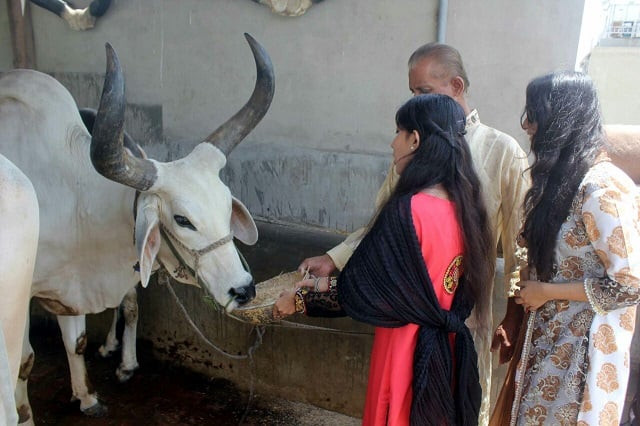
Saima and Madiha with their animals
PHOTO: EXPRESS
The rooftop shows paints the scene of tiny cattle pen or mini cattle market, entirely different from the rest of the three-story house. There are eight small and big animals kept under temporary sheds, as pitchers full of fodder and water lie beside them. Flies swarm smelly piles of dung lying on the ground, yet Saima seems unperturbed by any of it. “Rustam is my favourite,” she says, pointing at a brown two-and-half-year-old bull with light pink-tinged spots on its body.
Govt employees to enjoy 4-day Eidul Azha holiday
“I love Rustam, because he is so innocent and so beautiful,” Saima proudly tells The Express Tribune. Saima and her 16-year-old sister, Madiha, have been living with the animals in the same house for years. “The animals live on the rooftop and we are on the second floor,” she quickly adds. The wind blows in full force on the rooftop – a blessing for a majority of nearly two million residents of the port city, where the weather remains mostly humid.
“These are the sacrificial animals. We have kept and raised them on our rooftop for two years to sacrifice them on the Eidul Azha,” the girl explains with shining eyes. There are, in total, eight animals including two white bulls, one buffalo calf, four small calves, and three sheep. Saima and Madiha have named all of their animals.
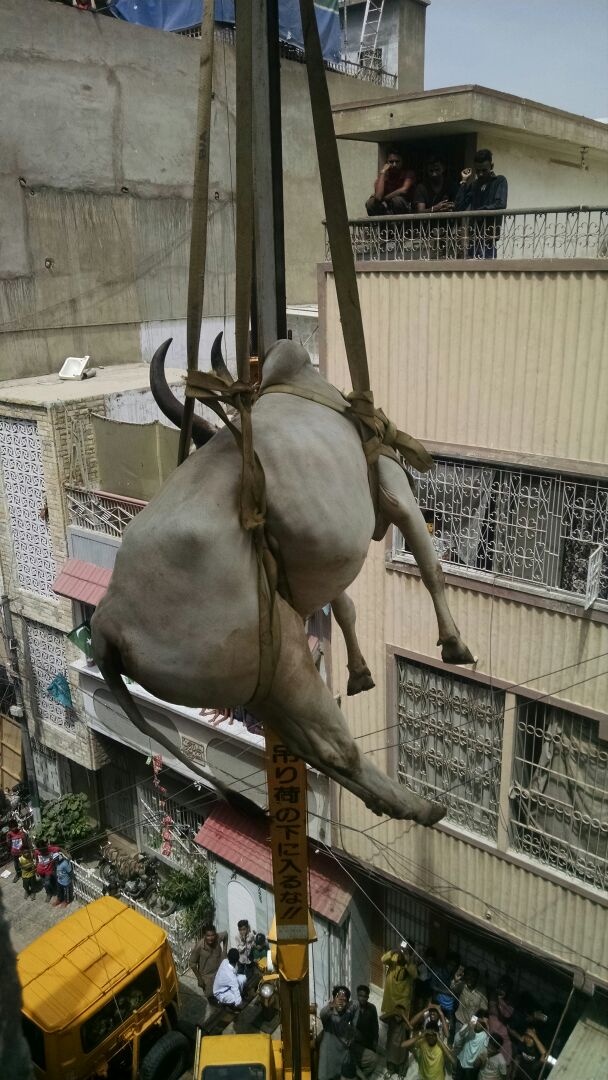 The animals are brought down by cranesPHOTO: EXPRESS
The animals are brought down by cranesPHOTO: EXPRESSThe white bulls are fondly known as Raja and Chand, both have large black horns that form the shape of a crescent. “We visit our animals twice a day. First, when we come back from school and then in the evening,” Madiha narrates. The sacrificial animals are a prominent feature of Eidul Azha celebrated across the Muslim world as one of the most important religious events in Islam. This Islamic event attracts children in particular, who find rare opportunities to interact with the animals in the urban centers and fall in short-lived love.
But, Saima and Madiha are the lucky ones, as they can love their animals throughout the year. “I feed Rustam. I speak to him and sometimes he answers with gestures. For example, if I call him, he recognises my voice and starts coming forward and going backwards,” she says smiling. “Sometimes, I play music on my smartphone and take it close to his ears. Rustam listens to it attentively and I think he enjoys the music because he doesn’t turn his ear to other side in irritation.”
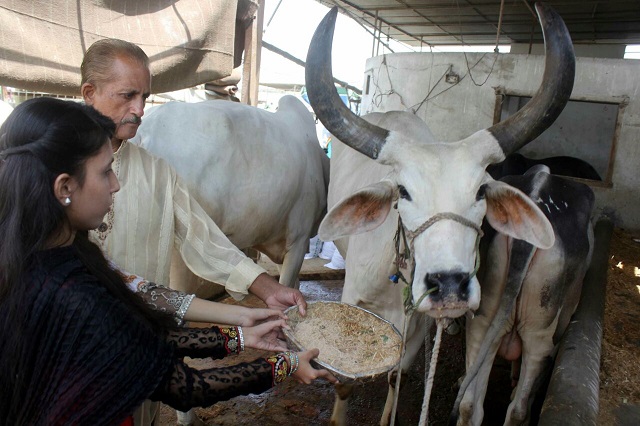 PHOTO: EXPRESS
PHOTO: EXPRESSHowever, keeping the large animals in residential areas can expose the owners to penalties from the local administration, which allows them only outside the city limits. The Karachi Metropolitan Corporation (KMC) can slap a fine on a citizen if neighbours complain about any nuisance created by the animals.
Rooftop love
Majority of the Karachiites live in small houses which do not have the space to house these animals. The two sisters say the love of their father, Syed Ejaz Hasan, for the animals led to the discovery of raising the animals atop their house. “Since childhood, we used to buy our sacrificial animals days or weeks before Eid,” Hassan, told The Express Tribune, adding, “but I wanted to keep them and raise them myself.”
Eidul Azha: Sheikh Rasheed to sacrifice camels
So, it was nine years ago, when he found a solution. He would buy calves from the cattle traders in Tando Adam and Badin, whom he has known for years, and take them to the rooftop of his residential building. “I transported the animal when they were around two-years-old, having two frontal teeth grown only. They were kept on the rooftop the whole year. Ten days before Eid, the animals are brought down through a crane,” he says.
Every year, the locality witnesses interesting scenes as the crane brings down the large animals from roof. Neighbours gather on their roofs, in the balconies and in the street. Each animal is carefully tied with straps to ensure their safety, and the crane lifts them from the roof and brings them some 50 feet down on the street. The girls, who have maintained a diary of contacts of journalists, will inform the print, particularly the electronic, media to cover the show.
"None of my neighbours has ever complained about the animals because no one knows how many animals are kept on the rooftop. It’s only the day they are brought down and everyone sees them fully grown-up,” the mechanical engineer tells proudly. On August 20, three big animals, three sheep and two small calves were brought down."
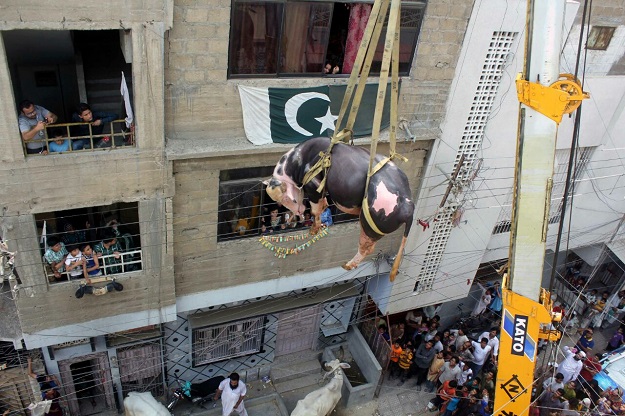 People watch as the animals are bought downPHOTO: EXPRESS
People watch as the animals are bought downPHOTO: EXPRESS“Weeks after Eidul Azha new young calves are brought in and taken to the rooftop for the next year,” Hassan says explaining the rooftop never goes empty. Asked if any special arrangements were made to strengthen the rooftop, Hassan’s reply was: “Nothing. Rustam weighs 16 mounds (640 kilograms) and each of the other two weigh 12 mounds or 13 mounds each,” he says.
Hasan said he was not raising the animals alone; four of his brothers also contributed equally. “The expense of each animal per day is around Rs500. So, we collectively spend and then collectively sacrifice the animals,” he says. A day before the animals go for their sacrifice, the girls said that they would miss their lovely animals, but hoped to get new ones soon.
Eidul Azha prayer timings
“On the day, they are sacrificed, we do not eat anything the whole day,” younger sister Saima says sadly, adding “but we know that they have to be sacrificed. After some days, our father will bring in new ones and we will raise them for one year.”


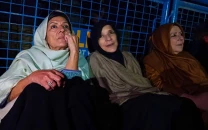
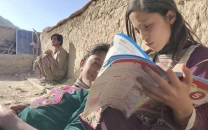


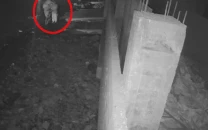



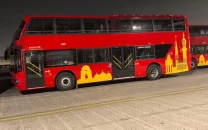








COMMENTS
Comments are moderated and generally will be posted if they are on-topic and not abusive.
For more information, please see our Comments FAQ